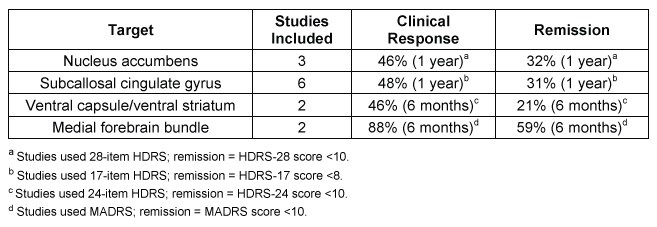Passage
Major depression is a mood disorder that affects nearly 7% of the American population and is the most common cause of disability worldwide. Standard treatment typically involves antidepressant medication alone, although a combination of antidepressant medication and psychological treatment, such as psychotherapy or cognitive-behavioral therapy, is often more effective. However, because depression has genetic, environmental, and psychological contributing factors, treatment can be challenging. Approximately 10% of those suffering from depression have treatment-resistant depression (TRD) that does not respond to standard treatment.A number of treatment options for those with TRD target the functioning of the nervous system. Deep-brain stimulation (DBS) , which is used to treat Parkinson disease, has also been investigated as a treatment for TRD. DBS involves implanting a device in the brain that sends electrical impulses to a specific area. Although the mechanism by which DBS alleviates depressive symptoms is unclear, neurostimulation provided by DBS is thought to disrupt dysfunctional patterns of electrical activity in local areas and connected brain regions.A meta-analysis reviewed the data from several studies that used different brain regions as DBS targets in the treatment of TRD. Table 1 shows the percentage of TRD patients who underwent DBS and showed clinical responsiveness and remission of depression. Clinical response was defined as a 50% reduction in scores on a measure of depression. Various scales were used in the studies, including different versions of the Hamilton Depression Rating Scale (HDRS) and Montgomery-Asberg Depression Rating Scale (MADRS) . Remission of depression was defined as a score that fell below a predetermined threshold.Table 1 Percentage of TRD Patients Who Showed Clinical Response and Remission With DBS Treatment

-According to the monoamine hypothesis:
A) abnormally high serum cortisol levels underlie most depressive symptoms.
B) abnormalities in a single neurotransmitter cause most depressive symptoms.
C) abnormalities in various neurotransmitters cause depressive symptoms.
D) DBS would be an ineffective treatment for depressive symptoms.
Correct Answer:
Verified
Q71: Passage
Psychophysiology examines the relationship between the properties
Q72: Passage
Psychophysiology examines the relationship between the properties
Q73: Passage
Psychophysiology examines the relationship between the properties
Q74: Passage
A common misconception in medicine is that
Q75: Passage
Visual perception involves the organization and interpretation
Q77: Passage
Psychophysiology examines the relationship between the properties
Q78: Passage
Visual perception involves the organization and interpretation
Q79: Passage
Psychophysiology examines the relationship between the properties
Q80: Passage
Major depression is a mood disorder that
Q81: Passage
Research suggests that cognitive changes occur with
Unlock this Answer For Free Now!
View this answer and more for free by performing one of the following actions

Scan the QR code to install the App and get 2 free unlocks

Unlock quizzes for free by uploading documents